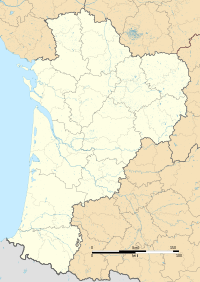Rom, Deux-Sèvres
| Rom | |
|---|---|
 Rom | |
|
Location within Nouvelle-Aquitaine region  Rom | |
| Coordinates: 46°17′38″N 0°06′59″E / 46.2939°N 0.1164°ECoordinates: 46°17′38″N 0°06′59″E / 46.2939°N 0.1164°E | |
| Country | France |
| Region | Nouvelle-Aquitaine |
| Department | Deux-Sèvres |
| Arrondissement | Niort |
| Canton | Lezay |
| Area1 | 52.38 km2 (20.22 sq mi) |
| Population (2006)2 | 807 |
| • Density | 15/km2 (40/sq mi) |
| Time zone | CET (UTC+1) |
| • Summer (DST) | CEST (UTC+2) |
| INSEE/Postal code | 79230 / 79120 |
| Elevation |
110–154 m (361–505 ft) (avg. 115 m or 377 ft) |
|
1 French Land Register data, which excludes lakes, ponds, glaciers > 1 km² (0.386 sq mi or 247 acres) and river estuaries. 2 Population without double counting: residents of multiple communes (e.g., students and military personnel) only counted once. | |
Rom is a commune in the Deux-Sèvres department in western France.
It was the Roman settlement of Rauranum, located at a ford on a little river on the Roman road between Limonum (Poitiers) and Santonum (Saintes), according to the Antonine Itinerary. At this posting stage or relay stage (mutatio), fresh horses could be found. It lay in the part of Gaul that became Aquitania in Late Antiquity. The Roman site, first rediscovered through aerial photography, is famous for its inscription to Epona. The streets of this vicus were paved with stone, its roofs covered with platelike terracotta tiles. Stone drums that once composed columns have been recovered in fields near the present parish church and built into the wall of its cemetery. Finds from excavations are presented in a format designed for children in the Musée de Rauranum, place de l'Église.
See also
References
External links
| Wikimedia Commons has media related to Rom (Deux-Sèvres). |
- Rauranum Brief entry.
- "La Gaule Romaine: enquête et compte-rendu du village de Rom" (pdf file)
- Musée de Rauranum